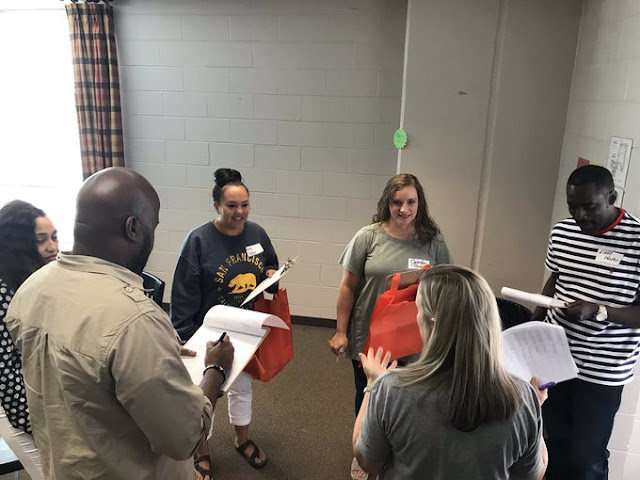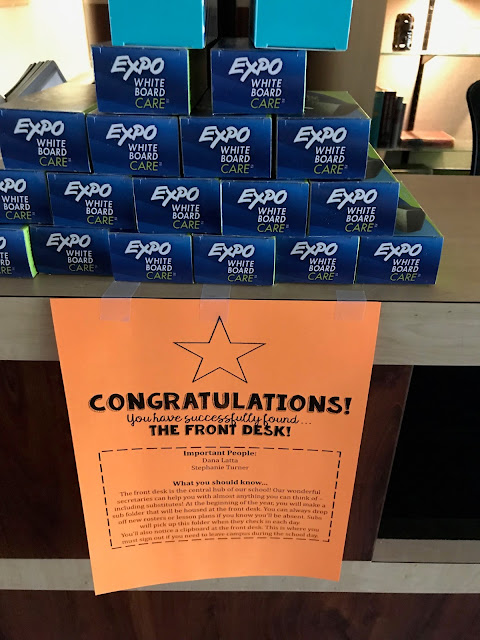This post contains affiliate links. All opinions are my own. Thanks for supporting TheCompelledEducator.com
I have been blessed during my long career in education to have had many pivots, roller coaster rides, and unique experiences. (You can listen to more about my journey on the In AWE Podcast, hosted by my friend Sarah Johnson.)
Working through the challenges has always been because I had a support network -- a group of family, friends, and colleagues who were able to give advice, encouragement, and the gift of their time. Because of them, it has led me to be even more intentional and passionate about mentoring others along their journeys.
L.E.A.D. is an acronym that I use when coaching others to find their greatness. Before we can lead others we must be able to lead ourselves, and L.E.A.D. provides a framework towards living our confident truths.
In a previous blog post, I shared resources to help Listen, Engage, Act, and Deliver.
In today's post, I'm sharing even more resources with you to add to your leadership toolbox.
During coaching sessions, I have the people I work with to do an exercise around the 80-20 rule. It can be a real eye-opener, and it also serves to create a greater awareness of really listening to others and not just hearing what is said.
Another practice that supports becoming a good listener is asking good questions. Curiosity sparks questioning, and one way to cultivate curiosity is to try something new. The act of discovery and learning will help to create a curiosity habit.
Additionally, ask clarifying questions whenever you're communicating with someone, especially when you may not see eye to eye.
Curiosity can also be sparked by reading. Shane Safir's book, "The Listening Leader," is a must-read for anyone in school leadership. (You can follow her on twitter @ShaneSafir)
Want to test your listening skills? Take the free Listening Quiz on Mindtools.com, create an account, and it will give you your score along with tips on improving your score.
In education, we stress that relationships with students are crucial. It is also crucial for leaders to build relationships with staff members. Employee engagement is a crucial component to effective leadership.
>Employee loyalty is decreasing
>43% of workers would be willing to leave their companies for a 10% salary
increase, and weak company cultures are to blame.
>Most cultures are decidedly mediocre
>We found that less than one third of people believe they have a strong culture
Culture is the biggest factor of employee engagement, and leaders have a huge impact and influence on an organization's culture.
"Employee-manager relationships have a big impact. How comfortable
employees feel about providing upward feedback to their supervisors is a major
indicator of overall happiness."
Reflection questions for leaders: Are you listening? What do you do with feedback from employees? Do all employees have equal opportunity to provide feedback? Do you encourage all types of feedback - positive and negative?
"First impressions affect long-term happiness. Effective onboarding is a crucial
part of the employee experience, and correlates to how employees feel about their companies overall."
Reflection questions for leaders: Are you being intentional about your induction/onboarding programs? What kind of first impression are you making at the interview? On the new employee's first day on the job? Are you being intentional about creating and sustaining a positive experience for new employees?
Simple actions to engage employees:
1. Get to know them
2. Look for strengths
3. Create opportunities for employees to contribute, lead, and use their strengths
4. Celebrate and recognize them
5. Show you care
Treat others like they will make a difference and they will.
-Jennifer Hogan
"We judge ourselves by our intentions. We judge others by their actions."
I'm not sure where or when I first heard this quote, but it has stuck with me for many years. It is one of those quotes that serve as two reminders for me.
The first is a reminder that we need to extend grace to ourselves and others for missteps as well as inaction. There is always more to the story, whether it's a private one or one that is not accessible to us.
The second reminder from the quote for me is to TAKE ACTION.
One speed bump in the leadership journey can be a lack of knowing the "how." Often, we have a purpose and a "why," but we lack the resources, ideas, or experience to know the "how," and it can halt us in taking action.
When I work with women through individual coaching, we work on pinpointing the exact speedbumps, then together we formulate strategies for overcoming the hurdles. Even without individual coaching, you can use the 80-20 principle to collect ideas and solutions. The next step is up to you. To act.
If you prefer to work alone and research your strengths to determine your next steps, an awesome must-read is the national best-seller, Strengths Based Leadership. Understanding your strengths will assist you on taking action on your leadership path.
**Each book comes with an access code to take Gallup's CliftonStrengths Assessment.
Leaders have a lot to deliver. We want strong, healthy cultures led by people who walk the walk.
With consistent, positive action, leaders can deliver value and results to staff members and the organization.
A checklist of 7 deliverables (Not all-inclusive):
> Praise
>Consistency in words, actions, and expectations
>Approachability
>Respect
>Clear and effective communication
>Personal accountability
>Flexibility
Leadership is a mindset and a skillset, and I encourage others to view it as a journey instead of a binary destination (you either have it or you don't.) There are highs and lows, successes and failures, and it is always filled with growth opportunities.
If you are a leader or aspiring leader who would like individual coaching, contact me for a free discovery call so that we can see if it would be a good fit for you. My desire is to encourage and empower you to be your very best.





















